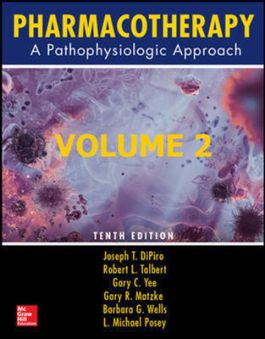EBOOK Pharmacotherapy 10e - Volume 2
- Note: the eBook does not include access to Connect
- Access the eBook anytime, anywhere: online or offline
- Create notes, flashcards and make annotations while you study
- Full searchable content: quickly find the answers you are looking for
Endocrinologic Disorders
- Chapter 01: Diabetes Mellitus
- Chapter 02: Thyroid Disorders
- Chapter 03: Adrenal Gland Disorders
- Chapter 04: Pituitary Gland Disorders
Gynecologic and Obstetric Disorders
- Chapter 05: Pregnancy and Lactation: Therapeutic Considerations
- Chapter 06: Contraception
- Chapter 07: Menstruation-Related Disorders
- Chapter 08: Endometriosis
- Chapter 09: Hormone Therapy in Women
Urologic Disorders
- Chapter 10: Erectile Dysfunction
- Chapter 11: Benign Prostatic Hyperplasia
- Chapter 12: Urinary Incontinence
Immunologic Disorders
- Chapter 13: Function and Evaluation of the Immune System
- Chapter 14: Systemic Lupus Erythematosus
- Chapter 15: Drug Allergy
- Chapter 16: Solid-Organ Transplantation
Rheumatologic Disorders
- Chapter 17: Osteoarthritis
- Chapter 18: Rheumatoid Arthritis
- Chapter 19: Osteoporosis and Osteomalacia
- Chapter 20: Gout and Hyperuricemia
Ophthalmic and Otolaryngological Disorders
- Chapter 21: Glaucoma
- Chapter 22: Allergic Rhinitis
Dermatologic Disorders
- Chapter 23: Acne Vulgaris
- Chapter 24: Psoriasis
- Chapter 25: Atopic Dermatitis
- Chapter 26: Dermatologic Drug Reactions and Common Skin Conditions
Hematologic Disorders
- Chapter 27: Anemias
- Chapter 28: Coagulation Disorders
- Chapter 29: Sickle Cell Disease
- Chapter 30: Drug-Induced Hematologic Disorders
Infectious Diseases
- Chapter 31: Laboratory Tests to Direct Antimicrobial Pharmacotherapy
- Chapter 32: Antimicrobial Regimen Selection
- Chapter 33: Central Nervous System Infections
- Chapter 34: Lower Respiratory Tract Infections
- Chapter 35: Upper Respiratory Tract Infections
- Chapter 36: Influenza
- Chapter 37: Skin and Soft-Tissue Infections
- Chapter 38: Infective Endocarditis
- Chapter 39: Tuberculosis
- Chapter 40: Gastrointestinal Infections and Enterotoxigenic Poisonings
- Chapter 41: Intra-Abdominal Infections
- Chapter 42: Parasitic Diseases
- Chapter 43: Urinary Tract Infections and Prostatitis
- Chapter 44: Sexually Transmitted Diseases
- Chapter 45: Bone and Joint Infections
- Chapter 46: Sepsis and Septic Shock
- Chapter 47: Superficial Fungal Infections
- Chapter 48: Invasive Fungal Infections
- Chapter 49: Infections in Immunocompromised Patients
- Chapter 50: Antimicrobial Prophylaxis in Surgery
- Chapter 51: Travel Health
- Chapter 52: Vaccines and Immunoglobulins
- Chapter 53: Human Immunodeficiency Virus Infection
Oncologic Disorders
- Chapter 54: Cancer Treatment and Chemotherapy
- Chapter 55: Breast Cancer
- Chapter 56: Lung Cancer
- Chapter 57: Colorectal Cancer
- Chapter 58: Prostate Cancer
- Chapter 59: Lymphomas
- Chapter 60: Ovarian Cancer
- Chapter 61: Acute Leukemias
- Chapter 62: Chronic Leukemias
- Chapter 63: Multiple Myeloma
- Chapter 64: Myelodysplastic Syndromes
- Chapter 65: Renal Cell Carcinoma
- Chapter 66: Melanoma
- Chapter 67: Hematopoietic Stem Cell Transplantation
Nutritional Disorders
- Chapter 68: Assessment of Nutrition Status and Nutrition Requirements
- Chapter 69: Parenteral Nutrition
- Chapter 70: Enteral Nutrition
- Chapter 71: Obesity
The most comprehensive text available on the use of evidence-based medication therapies for optimal patient outcomes – updated with the latest breakthroughs and guidelines.
NEW to this edition:
New focus on Personalized Medicine includes specific recommendations on the personalization of treatment and guidelines for integration of pharmacogenomic testing and implementation in practiceNew chapter on Travel HealthExtensively revised chapter on pulmonary arterial hypertension reflect the latest drugs and guidelinesMonthly updates on AccessPharmacy keeps the content fresh and currentMore than 20 online-only chapters in addition to printNew interior design keeps information flowing and makes chapters concise and to the pointCompanion Handbook is ranked #1 in Chemotherapy on Amazon and includes clearly-stated goals of therapy; the new Tenth Edition Casebook includes 150 + revised and updated cases. Pharmacotherapy: A Pathophysiologic Approach is written to help you advance the quality of patient care through evidence-based medication therapy derived from sound pharmacotherapeutic principles. The scope of this trusted classic goes beyond drug indications and dosages to include the initial selection proper administration and monitoring of drugs. You will find everything you need to provide safe effective drug therapy across the full range of therapeutic categories.
Presented in full-color the Tenth Edition is enriched by more than 300 expert contributors and every chapter has been updated to reflect the latest in evidence-based information and recommendations. This sweeping updates include tables charts algorithms and practice guidelines. This edition is also enhanced by a timely all-new chapter on Travel Health.
Here’s why this is the perfect learning tool for students, patient-focused pharmacists and other health care providers:
All chapters have been updated to provide the most current reliable and relevant information possibleKey Concepts at the beginning of each chapterClinical Presentation Tables summarize disease signs and symptomsClinical Controversies Boxes examine the complicated issues faced by students and clinicians in providing drug therapyColor coded diagnostic flow diagram treatment algorithms dosing recommendations and monitoring approaches clearly distinguish treatment pathwaysMost disease-oriented chapters include updated evidence-based treatment guidelines that often include ratings of the level of evidence to support the key therapeutic approachesEdition after trusted edition Pharmacotherapy: A Pathophysiologic Approach has been unmatched in its ability to clearly and impartially impart core pathophysiological and therapeutic elements that students and practitioners must be familiar with.

